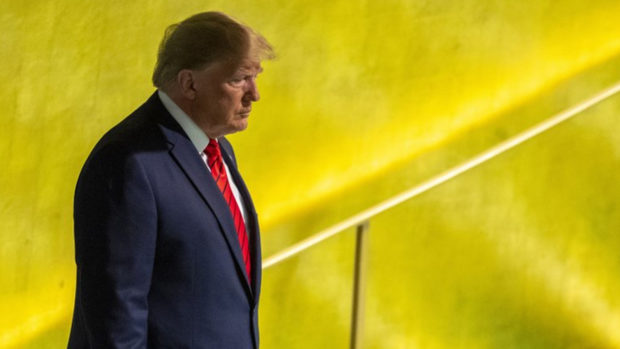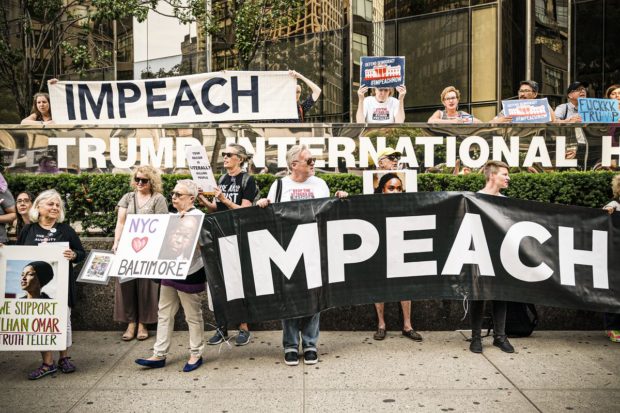How Does Impeachment Work?
The announcement Tuesday of a formal impeachment inquiry by the Democrats in the House of Representatives into President Donald Trump for abuse of power is a high-stakes gambit with uncertain consequences, here is How Does Impeachment Work.
Nancy Pelosi, the Democratic speaker of the House, had shown little appetite for impeachment during the first three years of Trump’s tumultuous presidency.
But the political scandal over Trump’s attempt to seek dirt from Ukraine on his potential 2020 Democratic presidential rival Joe Biden was the last straw for the top Democrat in the House.
Pelosi said the six House committees already investigating Trump on various grounds would proceed with their probes under the umbrella of an official impeachment inquiry
. “The president must be held accountable,” Pelosi said.
“No one is above the law.”
More than 150 of the 235 Democratic members of the 435-seat House have shown support for impeachment or the opening of an inquiry into removing the chief executive.
No House Republicans have come out in favor of impeachment and Republicans currently control the Senate, making conviction unlikely.
Trump tweeted that impeachment was “presidential harassment” and “witch hunt garbage.”
No president has been ousted from office by impeachment, but even the threat can bring one down — Richard Nixon resigned in 1974 to avoid certain removal in the Watergate scandal.
Two presidents beat the process: the House formally impeached Andrew Johnson in 1868 and Bill Clinton in 1998, but in both cases, they were acquitted in the Senate.
How Does Impeachment Work
If lawmakers believe a president is guilty of what the US Constitution calls “treason, bribery, or other high crimes and misdemeanors,” the process begins in the House of Representatives.
Any member can introduce an impeachment resolution which, like any other bill, is sent to a committee.
The process can be also be started without a resolution, as with the current impeachment inquiry.
The committee can review the evidence it receives, or carry out an investigation itself.
If the evidence is strong enough, the committee crafts articles of impeachment — the political equivalent of criminal charges — and sends them to the full House.
The House can pass the articles by a simple majority vote, “impeaching” the president.
The articles then go to the Senate, where a trial takes place, with representatives from the House acting as prosecutors and the president and his attorneys presenting his defense.
The chief justice of the Supreme Court presides over the trial in the Senate.
The 100-member Senate then votes on the charges, with a two-thirds majority necessary to convict and remove the president.
If the president is convicted, the vice president then takes over the White House.
– What kind of charges do presidents face? –
The accusations have to meet the constitutional standard of “high crimes or misdemeanors,” which is very broad.
In the cases of Clinton and Nixon, independent prosecutors conducted extensive investigations and amassed evidence to support criminal charges.
Nixon was accused of obstruction of justice, abuse of power, and contempt.
Clinton, in the Monica Lewinsky scandal, was accused of perjury and obstruction.
Trump could conceivably face charges of abuse of power for using his office to pressure Ukraine to conduct a politically-motivated investigation of Joe Biden and his son, Hunter, who had business dealings in Ukraine.
Special Counsel Robert Mueller, in the Russia election meddling investigation, also detailed multiple instances of alleged obstruction of justice by Trump that could arguably support charges.
Related Articles
Trump Questions Joe Biden and His Relationship With Ukraine
11 Year Old Boy Drives 3 Hours for Snapchat Meeting and Got Lost
Is it about law or politics?
The charge of high crimes and misdemeanors covers allegations of a range of misconduct — not just ordinary violations of the criminal code.
Going on holiday for a year, for example, is not illegal but would likely lead to a president’s impeachment for failing to discharge his duties under the constitution.
And while strong evidence is required, the impeachment process is very much political in nature, not criminal.
In past impeachments, support and opposition ran along party lines, though in Nixon’s case the offenses were so egregious that Republican backing for him quickly disintegrated.
In Democrat Clinton’s case, Republicans controlled the entire Congress. But when impeachment charges went to the Senate, the 45 Democratic Senators stayed united to block a two-thirds vote for conviction.
With Trump, Democrats are divided for political reasons.
Pelosi has argued that impeaching Trump would go nowhere in the Republican-controlled Senate and could damage the party’s effort to win full control of the Congress and the White House in the November 2020 elections.
Others in the party say Trump needs to be held accountable — that Democratic voters demand it, now that you understand How Does Impeachment Work you will be able to understand the setbacks the democratic party has to overcome.



